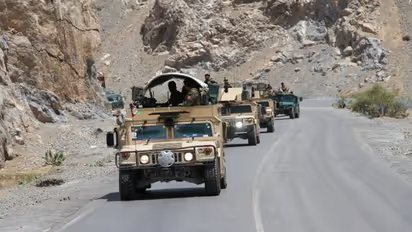India has a 'brand issue in Afghanistan, and it is clearly paying the price for it: Expert

Synopsis
Experts in India believe that the Taliban is a reality in war-torn Afghanistan, and New Delhi should have engaged with them much earlier.
Even as the Russia-led 'Extended Troika', also comprising the United States, China and Pakistan, will meet on August 11 in Qatar to devise strategies to push to talks on the Afghan peace process, the situation in the war-torn country is turning complicated by the day.
The Taliban has gained a stronghold in the southern and western parts of Afghanistan.
The situation in the war-ravaged country has been deteriorating since the US, and the NATO forces started returning home following US President Joe Biden's announcement in January this year.
India has so far maintained a neutral stand on Afghanistan.
However, the experts in India believe that the Taliban is a reality in the war-torn country, and New Delhi should have engaged with them much earlier.
Talking to Asianet Newsable, Prof Swasti Rao, Faculty at Department of Strategic and Security Studies, Aligarh Muslim University, said, "India's Afghanistan policy has not been successful. We kept towing the 'three red line' approach, which was softened from 2019 onwards but still lacked a clear will to engage with the Taliban."
"India denounces the Taliban on the grounds of being a long-standing victim of terrorism but failed to go with the times. Despite being the victim of the 9/11 terror attack, the US went ahead and cracked the Doha deal with them. India should have brought about a change in their outlook at the right time."
The Taliban-US deal paves the way for intra-Afghan dialogue on a political settlement and a comprehensive ceasefire.
Prof Rao also said that India should have taken advantage and establish rapport with the Taliban when it refused to criticise New Delhi over the abrogation of Article 370 in 2019 and said that the Kashmir issue is India's internal matter. The Taliban had even lambasted Pakistan.
"It has been two years, and we have been clearly paying the price for not having proactive engagement with them while everyone else was," she said.
On being asked why India has not been invited in the 'extended Troika', she said, "It is because India is not seen as a player that has any influence over the Taliban. The failure of Indian policy in Afghanistan is that of branding. We have branded ourselves as keen institution builders. Still, the major powers in the region see our role limited to the post-conflict rebuilding of Afghanistan and not as a player that can play a decisive role in intra-Afghan peace negotiation."
Prof Rao further added that the countries like the US, Russia, China, Pakistan and Iran have been talking to the Taliban for a long time.
"The key for Indian diplomacy was to understand that a peaceful Afghanistan is not possible without getting Taliban on the table regardless of how much aid we are giving to Afghanistan," Prof Rao added.
The upcoming August 11 meeting of the extended 'Troika' is the third such meeting called by Russia. Indian has not been part of any of the meetings. However, Russian Foreign Minister Sergey Lavrov had in June indicated that India would be included in the talks.
Talking about Iran, she said Tehran is also not invited to the Extended Troika, but 'the reason is its awkward relationship with the US'.
On being asked for a way forward for New Delhi, the Aligarh Muslim University Professor suggested three steps for consideration in efforts to remain relevant and protect its investments in Afghanistan.
India has so far invested over $3 billion in rebuilding infrastructure, including the country's Parliament.
The steps include forging a friendly alliance with Iran to utilise the ongoing UNSC presidentship and capitalise on the Blinken-Doval meet to converge Indian national interests in Afghanistan with that of the US. That's because India is the only US ally in this region despite retaining strategic autonomy by and large.
Check the Breaking News Today and Latest News from across India and around the world. Stay updated with the latest World News and global developments from politics to economy and current affairs. Get in-depth coverage of China News, Europe News, Pakistan News, and South Asia News, along with top headlines from the UK and US. Follow expert analysis, international trends, and breaking updates from around the globe. Download the Asianet News Official App from the Android Play Store and iPhone App Store for accurate and timely news updates anytime, anywhere.